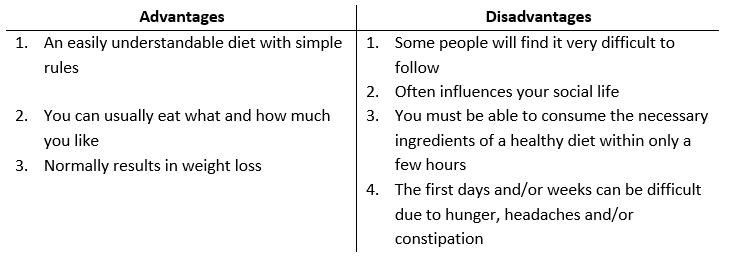Intermittent fasting: the latest secret to sustainable weight loss?

Being overweight and obesity is a growing problem in society. The associated health issues have led to more and more people looking for effective ways to lose weight. The hype is constant with one dieting method following another. A relatively new method is called intermittent fasting. This means that there are certain eating times when you eat a lot and then abstain from eating for a long period of time, i.e. fasting. But, is this an effective weight loss method? And, is it a sensible strategy for athletes?
Intermittent fasting is an umbrella term for all kinds of diets where nothing is eaten for a certain period of time. For example, fasting for a complete day every other day, or eating all of your food each day only during a period of a few hours. The most well-known example of intermittent fasting is Ramadan. You may only eat between sunset and sunrise and fast throughout most of the day.
In practice, this diet boils down to skipping one meal a day, which is usually breakfast. You eat your first meal at noon and the last meal at 8 pm at the latest. Within this block of time, you can eat whatever you like. Outside this block of time, you may only drink liquids without calories (e.g. water, coffee, tea or light drinks). And nothing else. However, there are a great many variations, such as fasting for an entire day, or only eating on every other day. The table below lists the pros and cons of intermittent fasting.

The idea behind intermittent fasting is exactly the same as the principle behind all other diets, namely, reduce the amount of calories you consume each day to create an energy deficit. The large block of the time when you fast overcompensates for the shorter time block when you eat a lot. Effectively, this results in an energy deficit over 24 hours and this inevitably leads to weight loss. Diverse scientific studies support this idea. Various variations of intermittent fasting do indeed lead to an energy deficit and, thus, this is an effective dieting method.
Is it better than other diets?
According to adherents of intermittent fasting, the method helps you lose weight and has more health benefits compared to other methods. More specifically, the diet causes metabolic changes that have a beneficial effect on your health. And, periodic fasting reduces blood pressure, cholesterol and the risk of diabetes mellitus type II. In fact, research supports the idea that intermittent fasting causes these beneficial effects, but also shows that the same effects can be caused by other diets that regularly restrict the amount of calories. This does not prove that it is solely due to the intermittent fasting approach, but simply that the resulting weight loss is the stimulus for the beneficial effects. So, no form of intermittent fasting is superior to other diets in achieving these effects.
Moreover, recent research shows the first small indication that intermittent fasting, despite the weight loss, can actually cause health problems in the long term. For example, it can have a negative impact on the pancreas (and thus the release of insulin). According to the researchers, this may increase the risk for various health issues, including diabetes mellitus type II. So, it is absolutely essential that you take great care with this dieting method.
Finally, it is sometimes claimed that the weight loss due to intermittent fasting only burns off fat while retaining muscle mass. This is contrary to the normal reduction in calories where the total weight loss accounts for a 25% reduction in muscle mass. In fact, the claims about intermittent fasting are disproved by diverse scientific findings. Weight loss due to intermittent fasting does involve a significant reduction in muscle mass. So, here again, intermittent fasting is no better than other low-calorie diets.
Intermittent fasting for athletes
Based on the current literature, we can conclude that intermittent fasting is, in fact, a method by which you can lose weight. However, this strategy is not recommended for athletes who want to lose weight. As previously stated, intermittent fasting results in the loss of muscle mass just like other diets. As the retention of muscle mass is crucial to many athletes, they are better served using a method where the loss of muscle mass is minimal. This requires a sufficient amount of proteins that are consumed throughout the day (see previous blog on this subject). Moreover, for optimal recovery and training progression, the timing of your nutritional intake relative to your physical exertion is extremely important. For example, fasting in periods close to when you exercise will create an energy deficit, which will negatively impact the quality of your training. You will also be deficient in the necessary amount of nutrients and fuel to recover properly. Moreover, studies on the athletic performance of athletes who participate in Ramadan show that this type of intermittent fasting leads to greater tiredness, worsened mood and more stress. In combination with the risk of reduced muscle mass, this dieting strategy is not recommended for athletes.
Summary
Just like many other diets, intermittent fasting is a method that can help you lose weight in the short term. However, it appears that it is not superior in any way whatsoever compared to existing methods that regularly reduce the amount of calories. And, there are even indications that it can have harmful health effects. So, carefully weigh up the pros and cons to determine whether this strategy is a healthy method to follow in the long term. At any rate, it does not seem to be the most ideal strategy for athletes. Rather, they should choose a diet where the focus is on the correct timing of consuming nutrients relative to exercise periods in order to safeguard optimal recovery and progression, while retaining muscle mass.
References
-
1. Seimon RV, Roekenes JA, Zibellini J, Zhu B, Gibson AA, Hills AP, Wood RE, King NA, Byrne NM, Sainsbury A. Do intermittent diets provide physiological benefits over continuous diets for weight loss? A systematic review of clinical trials. Molecular and Cellular Endocrinlogy, vol 418(2), p153-172, 2015.
https://www.sciencedirect.com/science/article/pii/S0303720715300800 -
2. Schubel R., Nattenmuller J., Sookthai D, et al. “Effects of intermittent and continuous calorie restriction on body weight and metabolism over 50 wk: a randomized controlled trial.” The American Journal of Clinical Nutrition, vol. 108, no. 5, pp. 933-945, Nov 2018.
https://doi.org/10.1093/ajcn/nqy196 -
3. Headland M, Clifton PM, Carter S, Keogh JB. Weight-Loss Outcomes: A Systematic Review and Meta-Analysis of Intermittent Energy Restriction Trials Lasting a Minimum of 6 Months. Nutrients, vol 8(6), nr 354, 2016.
http://www.mdpi.com/2072-6643/8/6/354 -
4. Tinsley GM, La Bounty PM. Effects of intermittent fasting on body composition and clinical health markers in humans. Nutrition Reviews, vol 73(10) p661-674, 2015.
https://academic.oup.com/nutritionreviews/article-abstract/73/10/661/1849182?redirectedFrom=fulltext -
5. Horne BD, Muhlestein JB, Anderson JL. Health effects of intermittent fasting: hormesis or harm? A systematic review. The American Journal of Clinical Nutrition, vol 102(2), p464-470, 2015.
https://academic.oup.com/ajcn/article/102/2/464/4564588 -
6. Chaouachi A, Leiper JB, Chtourou H, Aziz AR, Chamari K. The effects of Ramadan intermittent fasting on athletic performance: Recommendations for the maintenance of physical fitness. Journal of Sport Sciences, vol 30(1), p53-73, 2012.
https://www.tandfonline.com/doi/abs/10.1080/02640414.2012.698297 -
7. Bonassa ACM, Carpinelli AR. Intermittent fasting for three months decreases pancreatic islet mass and increases insulin resistance in Wistar rats. 20th European Congress of Endocrinology, Barcelona, 2018.


